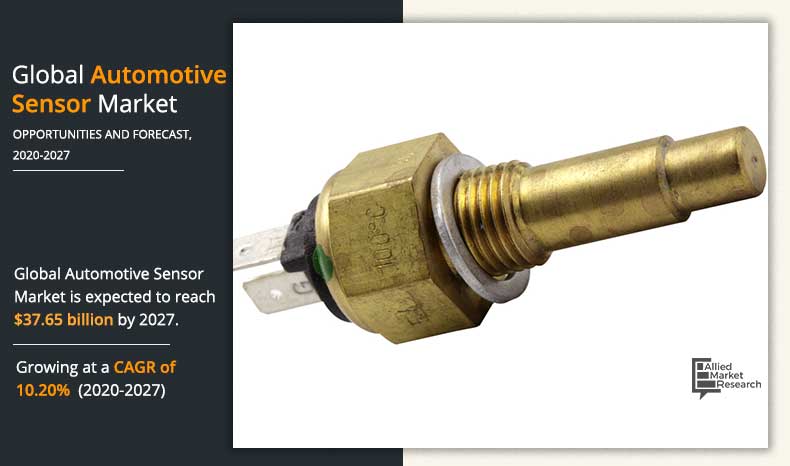Automotive sensors are used to detect and monitor different physical and chemical processes in a vehicle, which helps find out any issues that could occur in the future. With the help of automotive sensors, leading companies provide safety, comfort, and affordability to their consumers. It enhances the performance of a vehicle and increases its life span.
According to a new report published by Allied Market Research, titled, “Automotive Sensor Market by Technology and Application: Opportunity Analysis and Industry Forecast, 2019–2027” the global automotive sensor market size was $16.40 billion in 2019 and is projected to reach $37.65 billion by 2027, to register a CAGR of 10.2% during the forecast period. Asia-Pacific is expected to be the leading contributor to the global automotive sensor market, followed by North America and Europe.
Download Sample Report (Get Full Insights in PDF – 250+ Pages) @ https://www.alliedmarketresearch.com/request-sample/725
The report analyzes the global automotive sensor market growth, covering different technologies used for manufacturing of various sensor types. Sensor is a device that detects physical input such as heat, motion, pressure, or any other entity, and responds by producing an output on a display or transmits the information in electronic form for further processing.
The concept of driverless cars is based on the data collected by various sensors such as speed sensors, accelerometer, position sensors, and proximity sensors. This data is constantly collected and processed through a centralized control system, which controls the motion of a car, minimizing the need of a driver. Companies such as Google and Tesla are spending heavily on R&D of such cars and the technology is currently in its testing phase. Positive responses from tests are anticipated to drive the growth in the future.
Automotive sensors have great impact on the powertrain segment, which helps in monitoring different types of processes in engine such as air temperature, engine coolant temperature, and manifold absolute pressure (MAP). Powertrain sensors provide appropriate measurement value such as pressure, speed, and air, which is required by electronic control units. In addition, these sensors provide features such as robustness within the automotive environment; high accuracy implies precise control mechanism; and electromagnetic interference.
In addition, automotive sensors are ideally used in chassis to detect wheel position to enable closed loop chassis control. These sensors are usually mounted between the chassis and sprung component to measure suspension travel. In addition, chassis sensors are widely used in different vehicle applications such as travel sensors for rear axle steering, wheel speed sensors for advanced electronic stability program, and seat track position sensors for position detection.
Interested to Procure the Data? Inquire Here @ https://www.alliedmarketresearch.com/purchase-enquiry/725
By region, the automotive sensor market trends have been analyzed across North America, Europe, Asia-Pacific, and LAMEA. The analysis had identified that Asia-Pacific contributed maximum revenue in 2019. Between 2019 and 2027, the automotive sensor market in Asia-Pacific is expected to grow at a faster rate compared to other regions. Factors such as increase in adoption of fuel-efficient electric vehicles and surge in demand for advancements in sensors for electronics contribute to the market growth in Asia-Pacific.
Key Findings Of The Study
- In 2019, the temperature sensor segment accounted for the maximum revenue and is projected to grow at a notable CAGR of 6.8% during the forecast period.
- Asia-Pacific accounted for more than 45% of the automotive sensor market share in 2019.
- The gas sensor segment is expected to witness highest growth rate during the forecast period.
The key players profiled in the report include Robert Bosch, DENSO Corporation, AUTOLIV INC, Continental AG, Valeo, Delphi Automotive Company, Sensata Technologies, NXP Semiconductor, STMicroelectronics N.V, and Infineon Technologies AG. Market players have adopted various strategies such as product launch, partnership, and acquisition to expand their foothold in the automotive sensor industry.
About Us
Allied Market Research (AMR) is a full-service market research and business-consulting wing of Allied Analytics LLP based in Portland, Oregon. Allied Market Research provides global enterprises as well as medium and small businesses with unmatched quality of “Market Research Reports” and “Business Intelligence Solutions.” AMR has a targeted view to provide business insights and consulting to assist its clients to make strategic business decisions and achieve sustainable growth in their respective market domain.
We are in professional corporate relations with various companies, and this helps us in digging out market data that helps us generate accurate research data tables and confirms utmost accuracy in our market forecasting. Each and every data presented in the reports published by us is extracted through primary interviews with top officials from leading companies of domain concerned. Our secondary data procurement methodology includes deep online and offline research and discussion with knowledgeable professionals and analysts in the industry.
Contact us-
David Correa
Portland, OR, United States
USA/Canada (Toll Free): +1-800-792-5285, +1-503-894-6022
UK: +44-845-528-1300
Hong Kong: +852-301-84916
India (Pune): +91-20-66346060
Fax: +1(855)550-5975
Web: https://www.alliedmarketresearch.com
Follow Us on LinkedIn: https://www.linkedin.com/company/allied-market-research
